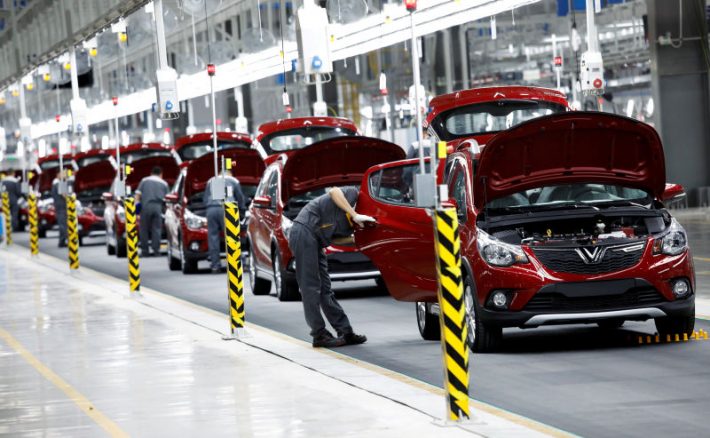The US House of Representatives has given narrow backing to a new law that seeks to tighten rules limiting Chinese content in electric vehicles that qualify for tax credits.
The Lower House voted 217 to 192 to support the bill, which will now go to the Senate, to tighten the definition of Chinese components that make vehicles ineligible for EV tax credits.
The Alliance for Automotive Innovation, which represents General Motors, Toyota Motor, Volkswagen, Hyundai and other car companies, said the bill would result in fewer vehicles qualifying and would mean aggressive rules on vehicle emissions and EV targets would need to be rolled back.
ALSO SEE: US, EU Firms’ Profits, Confidence in China Continue to Sink
CEO of the automaker group, John Bozzella, said those standards were based in part on the availability of EV tax credits and if the incentives are eliminated “the automotive industrial base faces a serious economic and national security risk from China, the US becomes less competitive, and the rug is pulled out from consumers.”
The bill, sponsored by Representative Carol Miller, would tighten the definition of a so-called “foreign entity of concern” that applies to China and other countries.
She said it would “ensure that Chinese companies can no longer benefit from electric vehicles tax credits meant for US manufacturers.”
The rules required under an August 2022 law are designed to wean the US electric vehicle battery supply chain away from China.
The US Treasury and Chinese Embassy in Washington did not immediately comment.
Currently, 22 of the 113 EV or plug-in hybrid models for sale in the US are eligible for the EV tax credit – and just 13 get the full $7,500 credit, Bozzella said.
In May, the US Treasury gave automakers additional flexibility on battery mineral requirements for electric vehicle tax credits on some crucial trace minerals from China, such as graphite.
The department said it would give automakers until 2027 to remove some hard-to-trace minerals like graphite contained in anode materials and critical minerals contained in electrolyte salts, binders, and additives.
Other anti-China bills
The EV tax credits legislation was one of a number of bills debated in Congress this week that seek to counter or curb China’s influence and power in sectors such as autos, biotech and drones.
Some moves, such as the Biosecure Act, which was backed by a 306-81 vote, had strong bipartisan support, but not everyone was happy.
Supporters have said that the US needs to reduce its reliance on China in its medical supply chain, while opponents say the biotech bill will have a big impact on pharmaceutical supplies, according to report by AP.
Companies fear the bill will delay clinical trials, raise the cost of medicines and slow the development of new drugs.
But supporters say the bill gives US firms eight years to decouple from companies in China such as WuXi AppTec and WuXi Biologics.
- Reuters with additional input and editing by Jim Pollard
NOTE: This report was expanded on Sept 13, 2024 to note other China-related bills considered by Congress this week.
ALSO SEE:
Strong Global EV Sales in August Despite Big EU Slump
Carbon Fibre Could Boost EV Ranges by 70%, Say Researchers – IE
Trump Would Axe US EV Tax Credit, Open to Musk Advisor Role
US Rules to Limit Chinese Access to EV Tax Credits Announced
Japan Warns US of Possible Jobs Hit From EV Tax Credit Rules
Revised Bill Gives US Firms Time to Cut Ties With China Biotechs
Chinese Biotech Giant WuXi ‘Sent US Client’s Data to Beijing’
China Investment Curbs May Not be Part of Key US Defence Bill
US Treasury Seen Limiting Chinese Role in EV Market – WSJ
SK Battery Firms Warn of Supply Chain Damage From US EV Rules
























